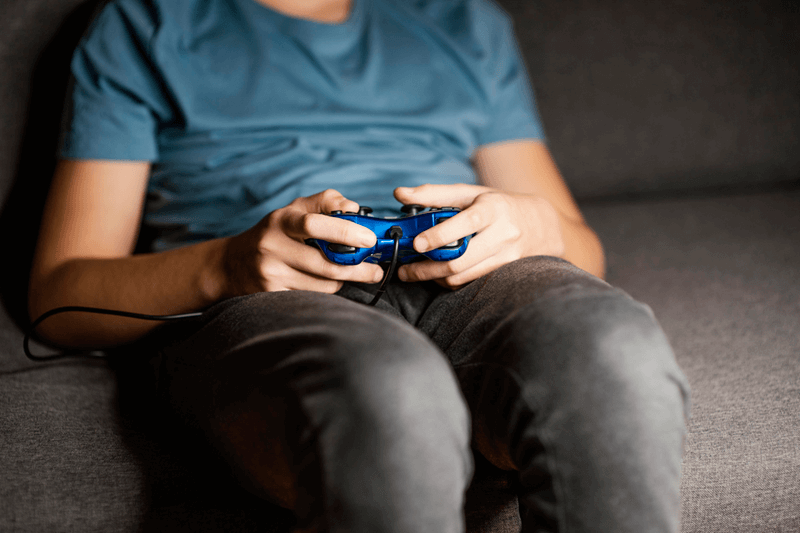

Gaming addiction, also known as Internet Gaming Disorder (IGD), is a complex behavioral issue that has gained significant attention in recent years. In 2018, the World Health Organization (WHO) officially recognized “gaming disorder” in the 11th Revision of the International Classification of Diseases (ICD-11), highlighting the growing concern surrounding excessive gaming habits.
According to the WHO, gaming disorder is characterized by a pattern of persistent or recurrent gaming behavior, either online or offline, manifested by three key criteria:
For a diagnosis to be made, this behavior pattern must be of sufficient severity to result in significant impairment in personal, family, social, educational, occupational, or other important areas of functioning, typically over a period of at least 12 months.
The chart below illustrates the prevalence of video game addiction among students from grades 3 to 12 based on a National Library of Medicine article. The data reveals a clear trend of increasing addiction rates as students progress through school years.
Many people including students can play video games extensively without developing problematic behaviors. The key distinction lies in the negative impact on various life aspects and the inability to control gaming habits.
The development of gaming addiction is multifaceted, involving a complex interplay of biological, psychological, and social factors.
Biologically, dopamine release during gaming creates a reward cycle, while genetic predisposition and differences in brain structure may increase susceptibility.
Psychologically, gaming can serve as escapism from real-world problems. Low self-esteem, pre-existing mental health conditions, and poor impulse control can also increase the risk of developing addictive gaming behaviors.
Social factors significantly influence gaming addiction. Social isolation may drive individuals to seek connection in online gaming communities. Peer influence and family dynamics can shape gaming habits.
Gaming addiction typically results from a complex interplay of biological, psychological, and social influences, requiring comprehensive prevention and treatment approaches.
Identifying gaming addiction involves observing behavioral changes and their impact on daily life. Key indicators include:
| Sign | Description |
|---|---|
| Preoccupation with gaming | Constantly thinking about gaming, even when not playing. |
| Neglect of responsibilities | Failing to complete schoolwork, chores, or other obligations due to gaming. |
| Changes in sleep patterns | A study found that 5th grade students with addiction symptoms reported not getting enough sleep due to gaming. |
| Social withdrawal | Preferring gaming over social interactions. In 6th grade, playing video games instead of spending time with others was a top priority for some students. |
| Mood changes | Becoming irritable or anxious when unable to play. |
The prevalence of these signs increases with age as the above study revealed that by 12th grade, 5.63% of students suffered from gaming addiction, while 71.83% were at risk.
When addressing concerns about gaming addiction with a loved one, it’s crucial to approach the situation with empathy and understanding. This can help create an environment where open, honest communication is possible. Here are some key strategies:
Remember, recovery from gaming addiction is a process. The study found that even in 6th grade, 73% of students were at risk of addiction. By approaching the situation with empathy and understanding, you can play a crucial role in supporting your loved one’s journey towards healthier gaming habits.
Overcoming gaming addiction requires a multi-faceted approach addressing underlying causes and providing support for lasting change.
An important thing to note is that the approach will vary significantly depending on whether you’re helping a friend or a family member like your child, sibling, or partner.
Supporting a friend with gaming addiction requires a compassionate approach. Express concerns privately using “I” statements to avoid accusation. Be a good listener without judgment and offer alternative activities to break the gaming cycle. Encourage seeking professional help if they’re receptive, offering to assist in finding resources or accompanying them to support groups.
Addressing gaming addiction within the family requires a unified and supportive approach. Start by holding a family meeting to discuss the issue openly, ensuring everyone has a chance to express their concerns and feelings. Work together to establish clear family guidelines about gaming time and usage, such as designated gaming hours or tech-free zones in the house.
Helping a partner with gaming addiction requires a delicate balance of support and boundary-setting. Open, honest communication is crucial – express your concerns lovingly, but firmly. Work together to establish agreed-upon gaming limits and create shared activities that don’t involve screens. Encourage your partner to seek professional help, offering to attend therapy sessions together if they’re comfortable.
Whether you’re helping a friend, coworker, or family member overcome gaming addiction, it’s crucial to promote overall well-being.
By supporting these healthy lifestyle choices, you can help create a balanced routine that reduces the urge to game excessively and promotes overall well-being.
Online therapy platforms like BetterHelp offer convenient access to licensed therapists specializing in addiction. Support groups, both in-person and online, provide a sense of community and practical coping strategies.
Of course don’t forget to set realistic goals with gradual gaming reduction and fun alternatives. Keep the conversation open, supportive, and judgment-free. If needed, consider seeking therapy for teens or couple therapy to address addiction issues and learn strategies to support your loved ones recovery as a unit. Remember, patience and consistency are key in this process!
It’s a compulsive pattern of excessive gaming that negatively impacts daily life and relationships.
Look for signs like neglecting responsibilities, prioritizing gaming over other activities, and experiencing withdrawal symptoms when unable to play.
Express concern privately, offer support, and encourage them to seek professional help.
Hold a family meeting to discuss concerns and establish clear guidelines for gaming time and usage.
Communicate your concerns openly and honestly, encourage seeking professional help, and set boundaries together.
